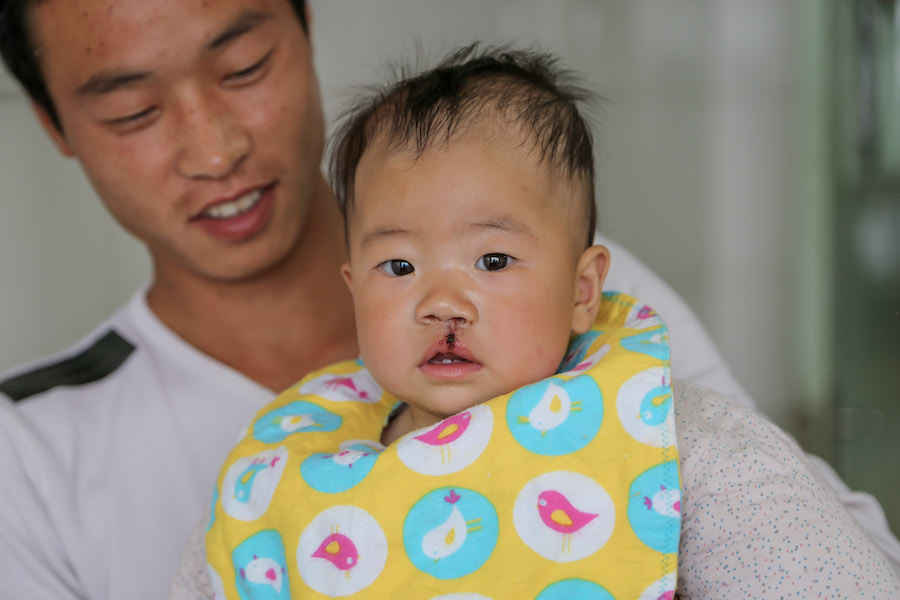
The organization, Love Without Boundaries, has organized 12 such humanitarian medical missions to impoverished countries
Two surgeons within the department of facial plastic surgery at the UC Davis Medical Center in Sacramento traveled to China as members of a week-long surgical mission trip organized by Love Without Boundaries, a United States-based nonprofit.
Dr. Travis Tollefson, a fellow of the American College of Surgeons, and Dr. Celeste Gary were among a volunteer team of five doctors and other logistical support staff who traveled at their own expense to Kaifeng in Central China to perform cleft lip and palate repairs on local orphans.
The April 17 to April 23 visit to China was the 12th international cleft surgery trip organized by Love Without Boundaries and is the eighth trip undertaken by Dr. Tollefson.
The goal of the trip was to assist medical professionals at the Kaifeng Children’s Hospital in performing and financing cleft lip and palate repairs, a medical procedure that corrects the facial birth defect. The developmental impairment is common within China and is especially prevalent among low-income orphan populations in rural China, who often lack the resources or capabilities to receive treatment.
“For unknown reasons, Asia has the highest incidence of babies born with cleft lip in the world. Due to the cultural stigma surrounding children born with this condition in China, thousands of babies end up being abandoned and placed into the orphanage system when they are born cleft affected,” said Amy Eldridge, CEO of Love Without Boundaries, in a statement. “By providing them with surgery, our hope is that all of the orphaned children healed by our medical team will then be able to find permanent homes through adoption.”
In addition to performing the surgeries, another goal of the trip is to better prepare and equip local Chinese doctors and medical professionals to be able to perform the procedure following the conclusion of the humanitarian mission.
“The benefit of this team is that we choose a site and then we train a local surgeon, as well as provide infrastructure, such as instruments, headlights and even one of the textbooks I wrote on complete cleft care,” said Dr. Tollefson. “That way when we leave we’ve trained someone who now will do all the work that we were doing and can make a difference in that manner.”
According to Dr. Tollefson, even though developmental malformations, including cleft lip and palate are often not life-threatening conditions, in low and middle income countries, they drastically affect the lives of those afflicted. Dr. Tollefson continued that major stigmas are attached to not only children with cleft lips, but also the children’s mothers.
“In Africa, it’s often described that when the father of a child finds out his baby has a cleft, the father will abandon the mother and the child because he believes there is something the mother had done wrong or that there is some form of curse,” said Dr. Tollefson.
He explained that in China, children with cleft lips face similar ignominy.
“With [China’s] one child policy, unfortunately there are a lot of orphans in China and many of these orphans have been abandoned because of their cleft lip and palate,” he said.
According to Dr. Star, orphans — especially in rural China — face many additional hardships independent from their disabilities.
“There is not a lot of support or care for orphans as far as education, nutrition and medical care. One of the organization’s focuses [is] to help establish those things in the orphanages,” Star said. “In addition to doing medical exchanges, they also have a presence in the orphanages in China, as well as what they call ‘healing homes’ for kids who are impoverished or in the orphanages. They also do educational programs at the orphanages because a lot of the orphans can’t attend school.”
According to Dr. Star, the visiting medical team, comprised of facial plastic surgeons, pediatric anesthesiologists, physicians and other medical support staff, worked in close proximity with local surgeons and other medical technicians. She added that both groups were able to collaborate effectively and foster an atmosphere of goodwill and cooperation.
“The staff of the hospital was so welcoming,” Star said. “They didn’t feel infringed upon at all. They were just really grateful for what we were offering for these kids.”
On previous surgical mission trips, Love Without Boundaries has integrated technology into their efforts to better understand regional distributions of developmental disabilities, as well as begin to discern the circumstances and patterns that result in the emergence of facial malformations in populations, especially within impoverished areas and in areas lacking modern medical infrastructure.
“I’ve been there over a dozen times working on research, evaluating where clefts occur in the country of Zimbabwe, using a mapping software, researching the improvement of surgical care in low and middle income countries, including doing research and training to help surgeons become better equipped to manage these kinds of problems themselves,” said Dr. Tollefson.
These efforts are all part of an emerging field of medicine described by Dr. Tollefson as Global Surgery.
“Global surgery is this field of study that is trying to bring the best surgical quality and care to all the areas of the world so that kids and adults can get care for things like car accidents or injuries so they don’t have lifelong disabilities,” Tollefson said. “This is just one way for us to help make sure that everyone is a citizen of the world and not just a citizen of the country they’re from.”
Written by: Jack Raineri – campus@theaggie.org


